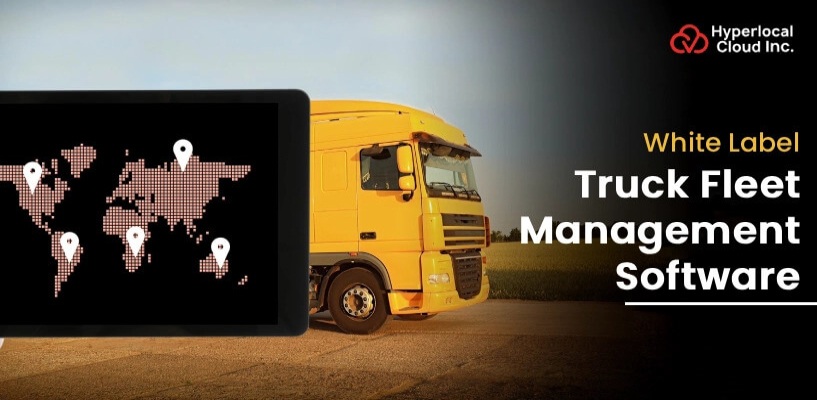White Label Truck Fleet Management Software

In the logistics and transportation world, handling a fleet of vans is no small challenge. Whether you own a handful of trucks or hundreds, the complexities of scheduling drivers, monitoring automobiles, monitoring fuel utilization, preserving cars, complying with policies, and handing over masses on time can crush even pro operations groups. This is where the truck fleet control software program comes into play.
Fleet management software program for vans gives a centralized set of virtual equipment that helps fleet operators manage many of the moving pieces that come with running a truck-based total transportation commercial enterprise. With growing strain on regulatory compliance, driver and automobile safety, and the need for real-time visibility, extra groups are turning to software solutions.
In the following sections, we’ll discover what such a software program is, how you can perform it, why a white label version gives advantages, the key capabilities, how AI amplifies its strength, how to construct one, tech stacks involved, who should use it, future tendencies, monetization possibilities, and ultimately wrap up with an end.
What is Truck Fleet Management Software?
Truck fleet management software is a specialized type of fleet management system designed for the unique demands of trucking operations, whether that’s long-haul freight, regional deliveries, container transport, or multi-state logistics. At its core, the software provides tools and dashboards to allow fleet operators to track, monitor, manage, optimize, and report on their truck assets, drivers, routes, loads, and maintenance.
Don’t Build From Scratch — White-Label and Launch Faster!
How is Investing in a White Label Truck Fleet Management Software Beneficial?
There are so many beneficial aspects to developing a truck fleet management software with a white label solution. Just have a look at the information below and get a detailed insight.
1. Speed to Market
This is advantageous if you want to get into the market fast and start servicing customers or internal fleet operations.
2. Focus on Core Business
Instead of diverting resources into building a complex platform, you can focus on your core business logistics operations, driver training, customer service, and marketing your fleet management offering while relying on the white label solution for the software infrastructure.
3. Risk Mitigation
Since the white label solution is likely built, tested, and used by other operators, the risks are reduced. Moreover, you often inherit a product that already complies with industry-standard features such as telematics integration, regulatory compliance modules, etc.
4. Localization & Niche Focus
In markets like India, where fleets vary widely in size and regulatory needs (for example, regulations like AIS-140) and language preferences vary, a white label provider can provide localization. You can brand it and perhaps customize it for your region while benefiting from an established base.
Know the Features and Functionalities of Truck Fleet Management Software
A truck fleet management software is full of advanced features and functionalities that we are going to discuss below. Let’s explore:
1. Real-time Tracking
Monitor each truck’s stay area, velocity, and direction development in real time. This characteristic facilitates enhanced dispatch accuracy, lessens idle time, and ensures timely deliveries by providing complete visibility into fleet actions.
2. Driver Management
Centralize driver profiles, overall performance records, and licensing statistics. Gain insights into driving force conduct via telematics, consisting of harsh braking, overspeeding, or long idling, to sell safety and performance.
3. Maintenance Management
Automate upkeep scheduling and receive signals for inspections, servicing, or component replacements. This proactive approach minimizes breakdowns, extends car lifespan, and reduces restoration expenses.
4. Fuel and Cost Management
Track gas intake, locate robbery, and reveal fees to manipulate operational prices. Integration with gasoline cards or IoT sensors ensures accurate reporting and optimization of gasoline performance.
5. Route Planning & Optimization
Use smart routing algorithms to identify the most green paths primarily based on distance, site visitors, and shipping schedules. This resulted in shorter shipping instances, decreased fuel usage, and improved client pride.
6. Asset & Load Tracking
Ensure visibility of shipment and trailer assets throughout the delivery chain. The device tracks load status, temperature (for perishable goods), and coping with situations to assure delivery integrity.
7. Telematics & Sensor Integration
Integrate with onboard telematics, IoT sensors, and ELDs (Electronic Logging Devices) for complete car diagnostics and driving force conduct tracking. This gives information-pushed insights into performance and protection.
8. Analytics & Reporting
Gain deep insights into operational overall performance through customizable dashboards and designated reports. Managers can analyze developments, benchmark KPIs, and make knowledgeable selections for continuous improvement.
9. Safety Modules
Stay compliant with regional and international transport guidelines. Features like digital logging, inspection checklists, and driving force hours-of-provider monitoring help keep protection and felony compliance.
10. Mobile & Driver App
Empower drivers with a cell app for navigation, mission updates, virtual proof of transport, and communication with dispatch. It complements real-time coordination and simplifies field operations.
Empower the Truck Fleet Management Software with AI-Powered Technologies
In today’s rapidly evolving era, developing a mobile application with artificial intelligence is an innovative move that enables businesses to launch a robust truck fleet management software utilizing the latest AI or ML technologies. Here, we have listed the AI-driven technologies that you can also consider for app development.
1. Driver Behavior Analytics
AI detects styles in motive force behavior, scoring drivers on safety and efficiency, and suggesting interventions (including training or warnings).
2. Dynamic Route Optimization
Machine learning fashions can issue in real-time site visitors, climate forecasts, vehicle load, driver relaxation instances, and advocate the excellent path or even re-path trucks mid-trip to lessen delays.
3. Fuel Efficiency Prediction
AI uses consumption patterns, idling time, load, and path situations to estimate gasoline utilization and provide steps to optimize performance.
4. Cargo and Asset Condition Monitoring
For specialized trucking, AI monitors sensor records in real-time to flag inconsistencies, helping identify previously damaged or adherence issues that arise.
5. Automated Reporting & Insights
AI can generate perceptions robotically, e.g., “Truck #47 has 20% higher gasoline cost than the fleet’s usual because idle time is 15% above baseline.” These applicable clarities save moments and set off corrective operations.
6. Scalable Data Handling
With fleets producing full-size quantities of records, AI allows significant evaluation where manual methods would fail.
Get a Tailored Quote for Your White-Label Fleet Management Solution
Consider the Development Process for Truck Fleet Management Software
Businesses should consult with an experienced mobile app development company that follows all the relevant steps to develop the application. Some of the essential development steps are mentioned below.
1. Requirement Gathering & Planning
The development journey starts with the information the client wishes, including identifying the fleet length, operational goals, and required integrations. A detailed plan is created to outline gadget architecture, features, and technical aspects.
2. Design & User Interface
On a serious note, businesses should go with the simple and eye-catching designs that help them to directly appeal to the users. The smoother the UI/UX, the higher the user base.
3. Development
For the development part, businesses get two primary choices: they can develop the software directly from scratch, or they can develop the software by utilizing a white label trucking app solution. However, the development cost and deployment time are the main factors that businesses should know before choosing the development method.
4. Deployment
Once improvement is complete, the software program software is examined, deployed, and included in the daily operations. Training durations and onboarding assist customers in adapting quickly and leveraging the gadget efficiently.
5. Maintenance
It is the duty of developers to maintain and replace the fleet control software even after the deployment. Additionally, by studying customers’ remarks, it becomes easier for organizations to enhance the performance of the software.
The Tech Stacks Involved in Building a Truck Fleet Management Software
A table of the advanced tech stack is discussed in the table that is used by experienced custom software development companies.
| Category | Tech Stack |
| Backend / Server Side | Java, .NET (C#), Python, Node.js.
PostgreSQL, MySQL, TimescaleDB, InfluxDB. RESTful or GraphQL Apache Kafka, RabbitMQ, AWS Kinesis TensorFlow, PyTorch AWS, Azure, or Google Cloud |
| Frontend / User Interface | Angular, React, Vue.js
Mapbox, Google Maps Android/Kotlin, iOS/Swift, or React Native, Flutter |
| Analytics, AI & Data Science | Snowflake, BigQuery, Redshift
Tableau, Power BI |
| Security, Compliance & DevOps | OAuth, SAML
GitHub/GitLab, Jenkins, Docker, Kubernetes |
| Integration and Ecosystem | ERP/CRM |
Understand For Whom is a Truck Fleet Management Software
Here we provide the information that lets you know who can utilize the truck fleet management software.
1. Truck Fleet Owners
Owners coping with multiple motors can monitor operations in real time, reduce costs, and ensure compliance through centralized control gear.
2. Logistics Providers
3PL agencies gain from better visibility, optimized routing, and seamless communication between dispatchers, drivers, and clients.
3. Leasing / Rental Fleet Companies
Rental and leasing operators use fleet management software programs to monitor automobile usage, preservation, and billing cycles for improved asset usage.
4. Specialized Freight / Niche Fleets
Fleets managing temperature-managed, hazardous, or outsized shipments can leverage tailor-made monitoring and compliance modules for safe and green transport.
5. Medium and Small Fleets
Small and mid-sized fleets benefit from competitive advantages with price-powerful, cloud-based fleet management solutions that improve performance and transparency.
6. Truck OEMs & Fleet Integration Partners
Truck manufacturers and OEM partners use fleet software to offer connected automobile answers, performance records analytics, and included after-sales aid.
The Upcoming Trends in the Truck Fleet Management Software
A lot of trends are expected to be introduced by the fleet management software in 2026. A list of some upcoming trends is discussed below.
1. Electric Vehicles
As electric-powered and hybrid vans turn out to be more commonplace, fleet control software programs will need to aid battery fitness tracking, charging station scheduling and optimization, range prediction, route planning with charging stops, and integration with EV infrastructure.
2. Generative AI Analytics
Beyond basic predictive maintenance, generative AI, reinforcement learning, and more advanced analytics will enable more dynamic decision-making, such as optimal truck replacement planning, scenario modeling, dynamic pricing, and dispatch.
3. Internet of Things
The number of sensors and connected devices in trucks is increasing. The data generated will be fed into fleet software, enabling better granularity in monitoring and decision-making.
4. Cloud-First Models
Cloud/SaaS deployment is becoming dominant as it offers scalability, a decrease in operational expenses, speedy updates, and less complicated integration. For smaller fleets, particularly, this makes adoption less difficult.
5. Real-Time Visibility & Customer Expectations
End customers expect real-time updates, transparency, and accuracy on delivery status. Fleet software will offer real-time dashboards not only to operators but also to customers/shippers.
6. Multi-Modal and Multi-Fleet Integration
As logistics companies manage more complex networks, fleet management software will evolve to support multimodal operations and coordinate across different fleet types.
Request a Free Demo of Our White-Label Fleet Management Platform Today!
Unleash the Monetizing Opportunities from the Truck Fleet Management Software
If you’re building or offering a truck fleet management software, especially under a white label model, there are multiple monetization opportunities beyond just license fees. Here are ideas to unlock revenue streams:
1. Subscription Model
Charge fleet operators a monthly or annual subscription per vehicle or per fleet size. Offer tiered plans: basic tracking only, premium. This provides recurring revenue and predictable cash flow.
2. White Label Branding Fees
If you offer the software as a white label to third-party providers (for example, 3PLs or logistics consulting firms), you can charge an initial branding/setup fee and ongoing support fees. Clients pay to offer the platform under their own brand and to their own clients.
3. Data Services & Benchmarking
As your platform aggregates data from many fleets, you can anonymize and aggregate data to provide benchmarking services, “Your fleet’s fuel consumption vs industry average”, “Driver behavior compared to similar fleets”. Offer this as a premium analytics report or consulting service.
4. Hardware & Integration Services
Many fleets require hardware installation (GPS trackers, telematics, sensors). You can bundle or offer hardware as part of the package, earning a margin on hardware sales or installation services. Or partner with hardware vendors and earn referral fees.
5. Fleet Performance Improvement Guarantees
You could offer performance-based contracts: for example, guarantee a reduction in fuel cost or maintenance cost and charge based on savings. This model aligns your revenue with client success.
6. Licensing / OEM Partnerships
You can license your software to vehicle OEMs (truck manufacturers) who want to offer fleet management apps as part of vehicle purchase or lease. This opens a B2B2C revenue stream.
Conclusion
In short, truck fleet management software has evolved from simple tracking tools to comprehensive operational platforms. For trucking companies, logistics providers, leasing companies, and software providers, it provides a powerful means of reducing costs, improving uptime, increasing safety, complying with regulations, and gaining visibility into an otherwise complex operation.
By choosing Hyperlocal Cloud as your mobile app development partner, businesses can build their own truck fleet management app. As we have experienced in on-demand app development, we understand that today’s market requires feature-rich solutions. Start your business journey with our expertise. Contact us now!





